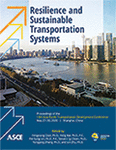13th Asia Pacific Transportation Development Conference
Research on Intersection Phase Timing Calculating Method Based on Interval Detection Data
Publication: Resilience and Sustainable Transportation Systems
ABSTRACT
Traditional traffic detectors can only obtain cross-section traffic detection data, which restricts the practical application level of signal control theory. At present, the new detector has created better data application conditions for traffic signal control. Millimeter-wave radar can track and acquire traffic flow, speed, and occupancy data of multiple targets in a certain interval. Based on this interval detection data, a new method of expressing traffic state is proposed. The reliability of this method for expressing supersaturated traffic state is illustrated by the analysis of actual detection data. Finally, a new method of intersection phase timing calculation based on interval detection data is proposed. Taking an actual intersection in Tongzhou as an example, based on the actual collected interval detection data, the traffic signal timing scheme under unsaturated and over-saturated conditions is calculated by using the intersection signal timing algorithm proposed in this paper, and compared with the algorithm given by TRANSYT. The results show that the new method of signal control at single intersection can effectively reduce the delay of vehicles at intersections, and has a significant effect on traffic congestion in the direction of traffic congestion, and achieves a good effect of improving the level of signal control services at intersections.
Get full access to this article
View all available purchase options and get full access to this chapter.
REFERENCES
Abbas, S.A., Sheraz, S.M., and Noor, H. (2009). "Fuzzy Rule Based Traffic Signal Control System for Oversaturated Intersections.".
Campbell, R., and Skabardonis, A. (2014). Issues Affecting Performance of Adaptive Traffic Control Systems in Oversaturated Conditions.
Ceder, A., and Reshetnik, I. (2001). "An algorithm to minimize queues at signalized intersections." J. Oper. Res. Soc., 52(6), 615-622.
Fang, C.F., and Elefteriadou, L. (2010). "Modeling and simulation of vehicle projection arrival–discharge process in adaptive traffic signal controls." J. Adv. Transport., 44(3), 176-192.
Hao, J., Hou, Z., and Liu, X. (2013). "Queuing Length Equilibrium Control at Single Intersection Based on Multi-parameter Programming." Control and decision-making, (4), 595-599.
Hu, P., and Yang, A. (2016). "Signal timing optimization of T-intersection based on queue length." Automation Technology and Application, 35(6), 23-27.
Lee, J., Abdulhai, B., Shalaby, A., and Chung, E.H. (2005). "Real-Time Optimization for Adaptive Traffic Signal Control Using Genetic Algorithms." J. Intell. Transport. S.
Lertworawanich, P., Kuwahara, M., and Miska, M. (2011). "A New Multiobjective Signal Optimization for Oversaturated Networks." IEEE T. Intell. Transp., 12(4), 967-976.
Li, R., and Tang, J. (2015). "Dynamic programming optimization model for traffic signal control at supersaturated intersections." J. Transp. Eng., 15(6), 101-109.
Qi, C., Hou, Z., and Jia, Y. (2012). "Intersection Signal Timing Optimization Strategy Based on Queue Length Equilibrium." Control and decision-making, 27(8), 1191-1194.
Royani, T., Haddadnia, J., and Alipoor, M. (2010). "Traffic signal control for isolated intersections based on fuzzy neural network and genetic algorithm.".
Sun, W., Wang, Y., Yu, G., and Liu, H.X. (2016). "Quasi-optimal feedback control for an isolated intersection under oversaturation." Transportation Research Part C, 67 109-130.
Talmor, I. (2007). "Signal Design for an Isolated Intersection during Congestion." J. Oper. Res. Soc., 58(4), 454-466.
Wang, L., Zhang, L., Pan, K., and Li, Z. (2016). "Signal Switching Control of Intersection Based on State Controllability Analysis." Journal of Zhejiang University (Engineering Edition), 50(7), 1266-1275.
Xiang, W., Xiao, J., and Jiang, Y. (2014). "Hybrid Control of Oversaturated Signal Intersection Based on Switching System." Transportation System Engineering and Information, 14(2), 57-61.
Information & Authors
Information
Published In
Resilience and Sustainable Transportation Systems
Pages: 109 - 117
Editors: Fengxiang Qiao, Ph.D., Texas Southern University, Yong Bai, Ph.D., Marquette University, Pei-Sung Lin, Ph.D., University of South Florida, Steven I Jy Chien, Ph.D., New Jersey Institute of Technology, Yongping Zhang, Ph.D., California State Polytechnic University, and Lin Zhu, Ph.D., Shanghai University of Engineering Science
ISBN (Online): 978-0-7844-8290-2
Copyright
© 2020 American Society of Civil Engineers.
History
Published online: Jun 29, 2020
Published in print: Jun 29, 2020
Authors
Metrics & Citations
Metrics
Citations
Download citation
If you have the appropriate software installed, you can download article citation data to the citation manager of your choice. Simply select your manager software from the list below and click Download.
